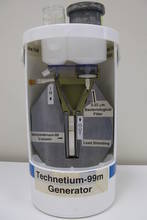What are Radiopharmaceuticals?
The Radiopharmacy is an integral part of the Nuclear Medicine Department that deals largely with the preparation, dispensing and quality control of radio-pharmaceuticals.
Most of the doses used in diagnostic imaging  use the radioactive element Technetium-99m which is obtained from a small Molybdenum-99 Generator, delivered to the department at the start of each week. Technetium is often mixed with a non-radioactive compound in order to localise the radiopharmaceutical in a specific area in the body.
use the radioactive element Technetium-99m which is obtained from a small Molybdenum-99 Generator, delivered to the department at the start of each week. Technetium is often mixed with a non-radioactive compound in order to localise the radiopharmaceutical in a specific area in the body.
Other types of radioactive compounds may be used for specialised scans or therapies. They must be used within a set period of time, which is dependant on the radioactive half-life or decay time (the time it takes for a radioactive substance to loose half its radioactivity).
Each type of Nuclear Medicine procedure will have a prescribed radiopharmaceutical and radioactive dose, measured in MBq. The amount of radioactivity is kept as low as possible and is individually calculated for children based on weight.  The dose is usually administered by IV injection into a vein in the arm (pictured) but can also be given subcutanously (Sentinal Lymph Node), orally (Gastric Emptying) or breathed in as a gas (Lung Ventilation Scan).
The dose is usually administered by IV injection into a vein in the arm (pictured) but can also be given subcutanously (Sentinal Lymph Node), orally (Gastric Emptying) or breathed in as a gas (Lung Ventilation Scan).
The short 6-hour half-life of Technetium means that the radiopharmaceutical will clear rapidly from the body. Some radiopharmacuticals may also be cleared through the urine or excreted in breast milk.
For some scans, adults are advised to avoid close, continuous, contact with children for the rest of the day (refer to appointment letter).
It is important for us to know if you are Pregnant or Breastfeeding.
What about Safety?
In Nuclear Medicine every precaution is taken.
Exposure to radiation is:
Low:
| Only small quantities are used for diagnosis. |
Short:
| The radioactive compounds used in diagnostic tests are quickly eliminated from the body. |
| Carefully Controlled: | Imaging services are IANZ Accredited which means that high standards for quality and safety are set and maintained.
The department is also accredited with the ANZSNM.
The Office of Radiation Safety is a Specialist Unit within the NZ Ministry of Health responsible for regulating the use of ionising radiation. |